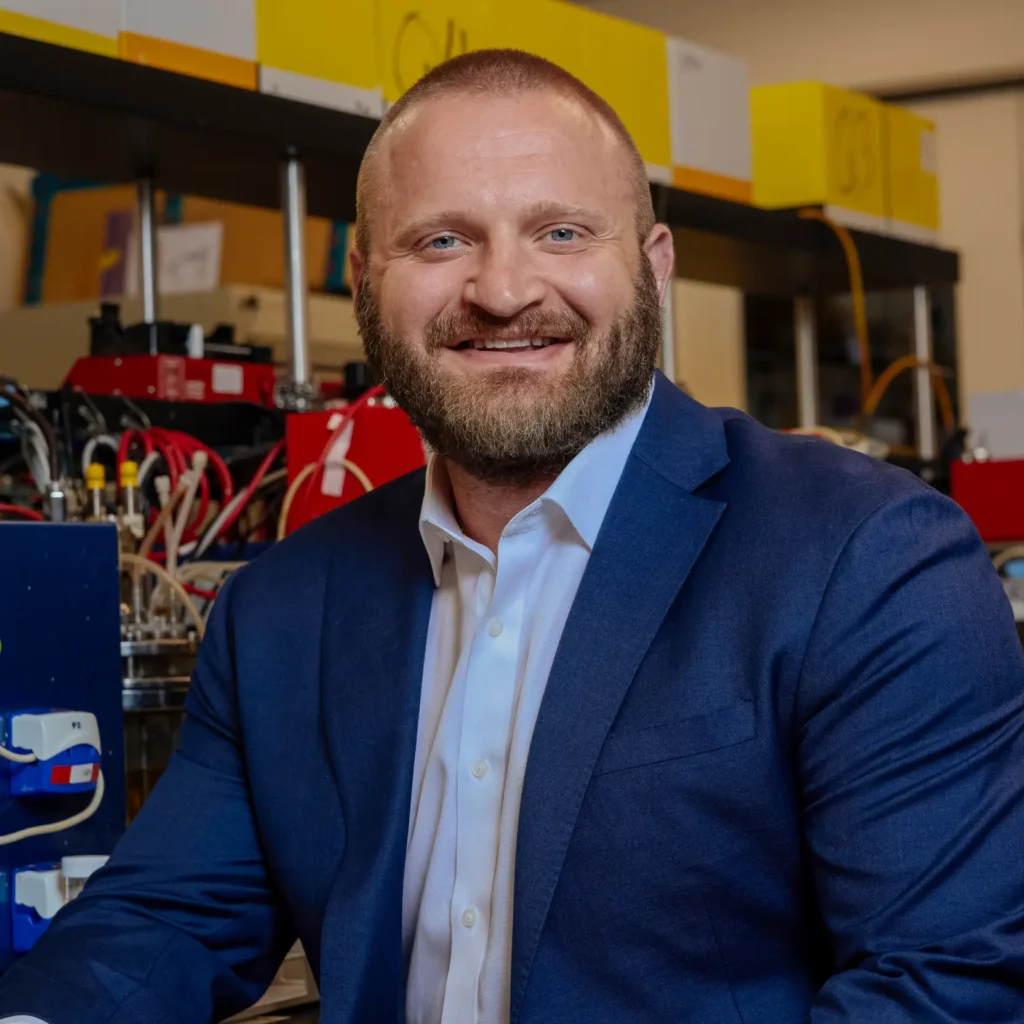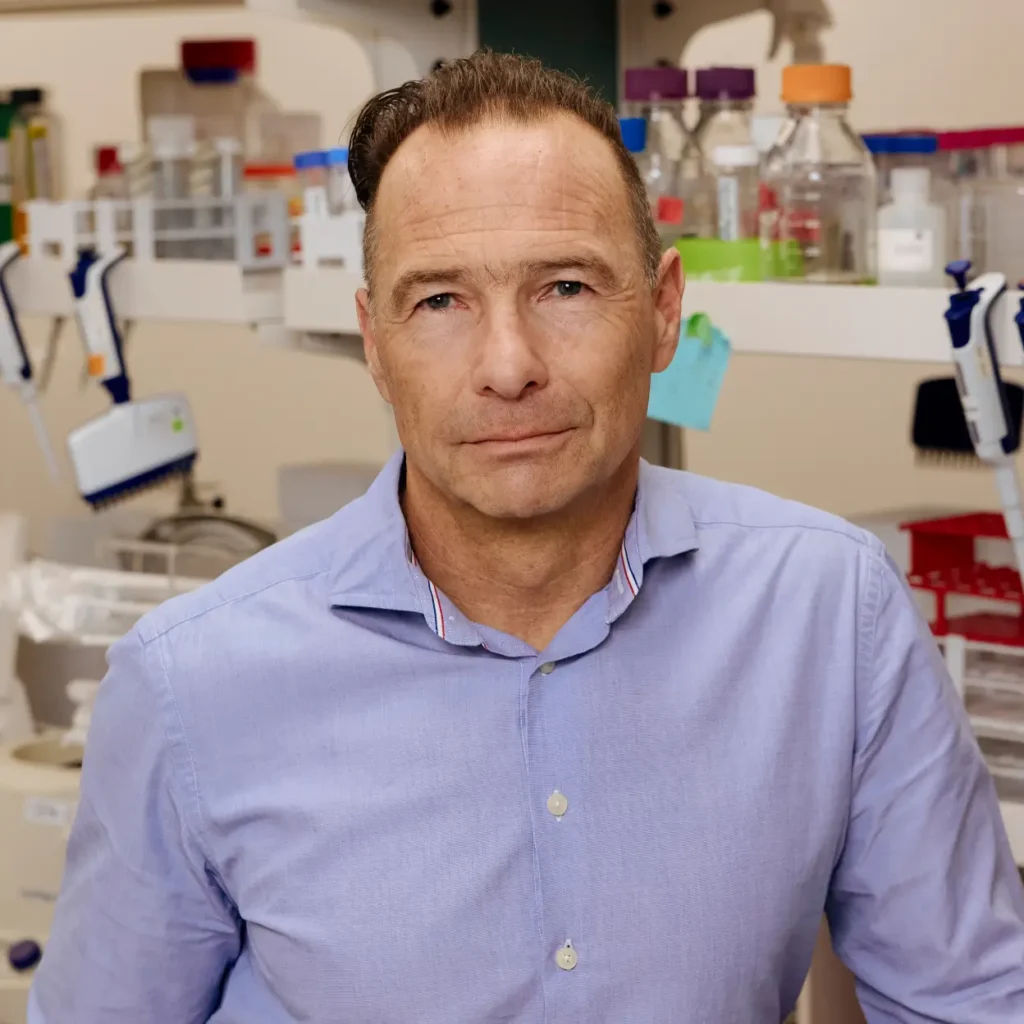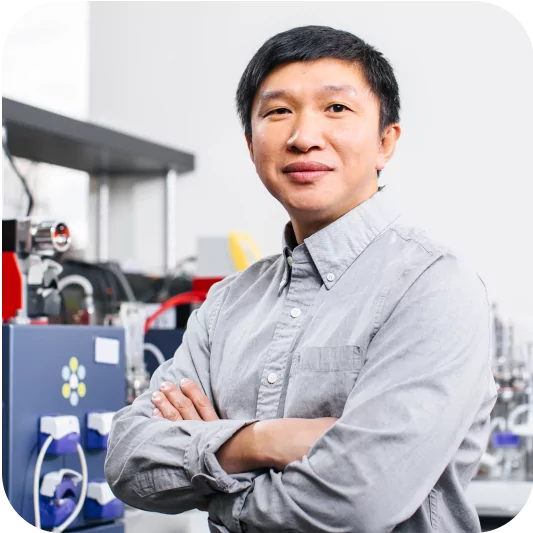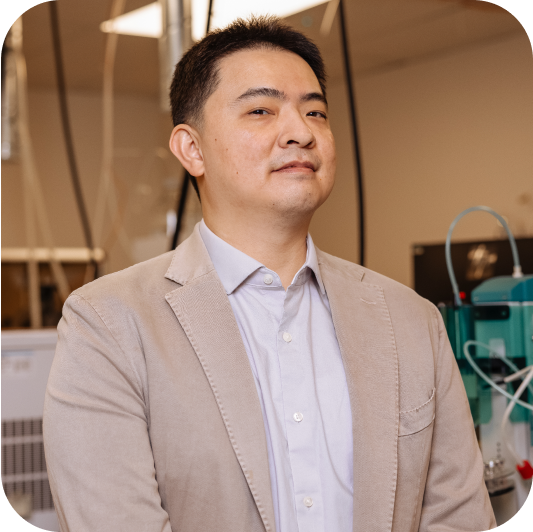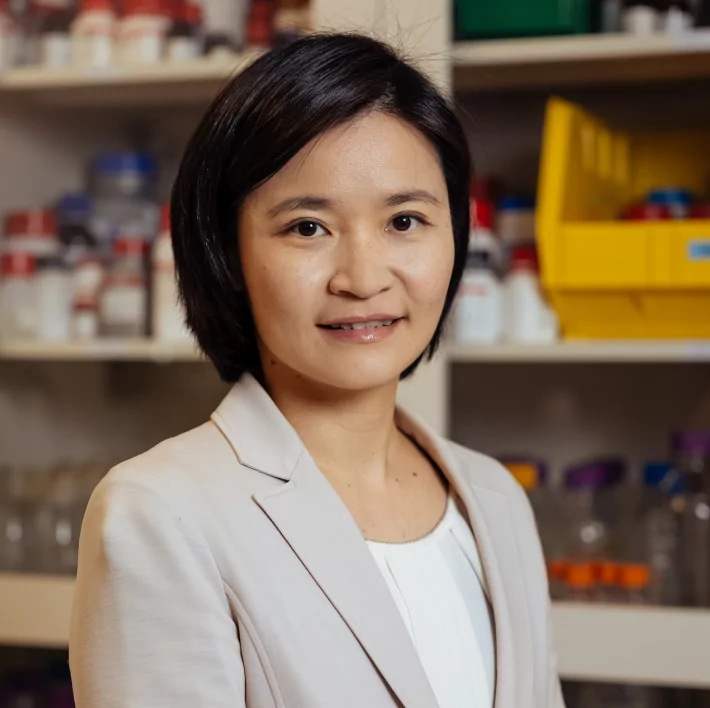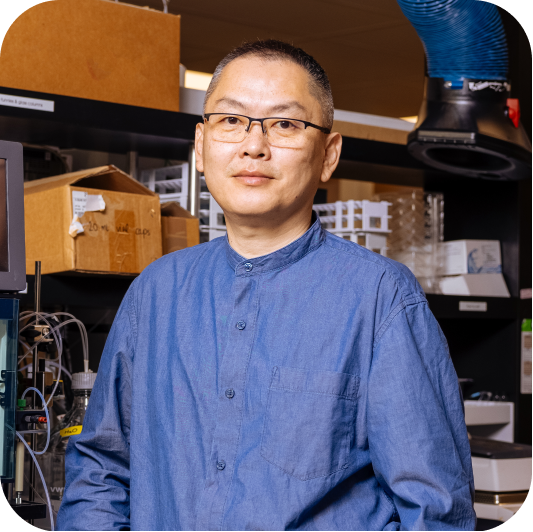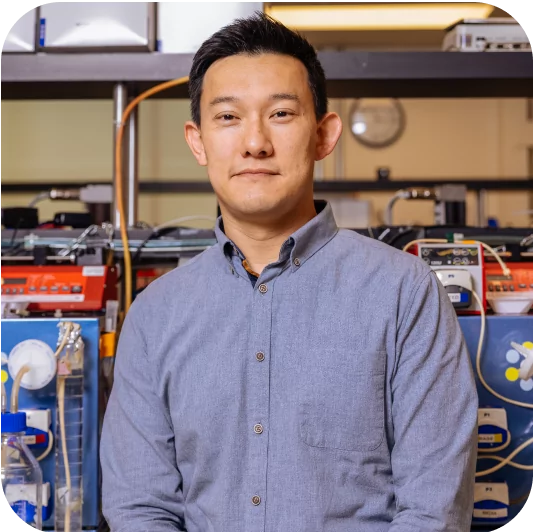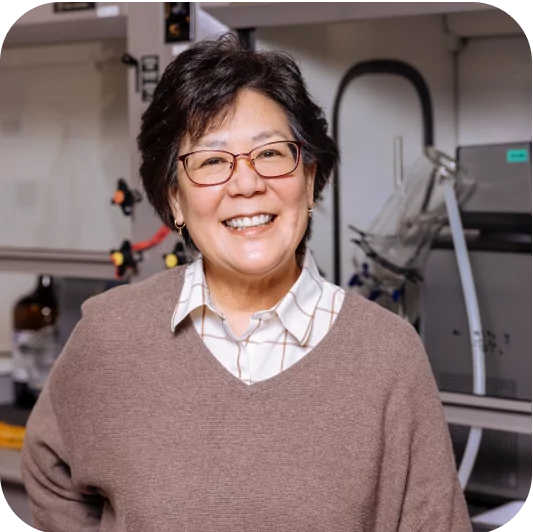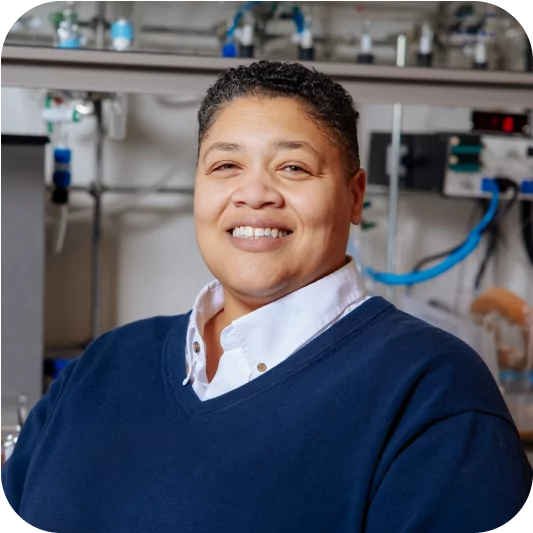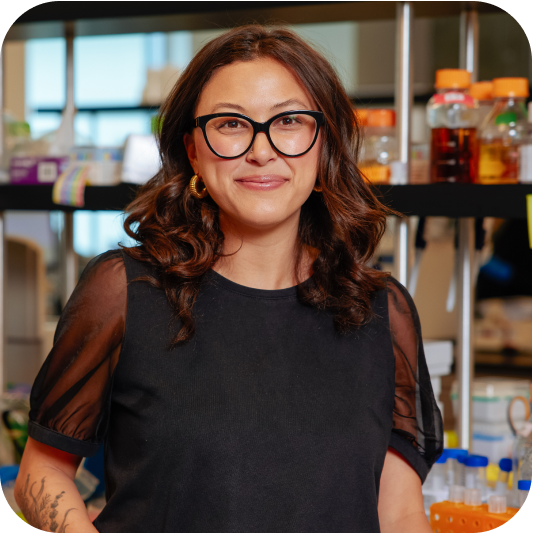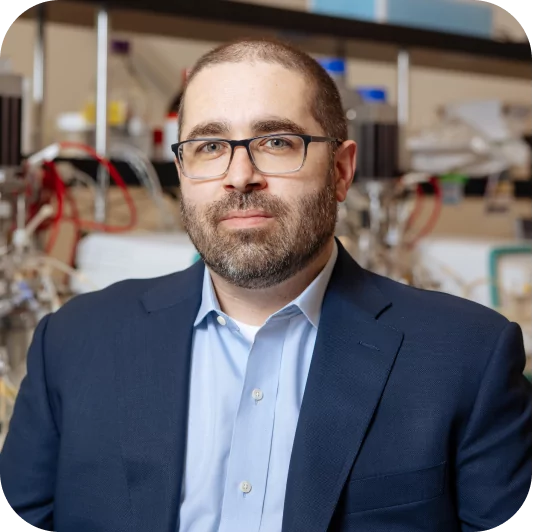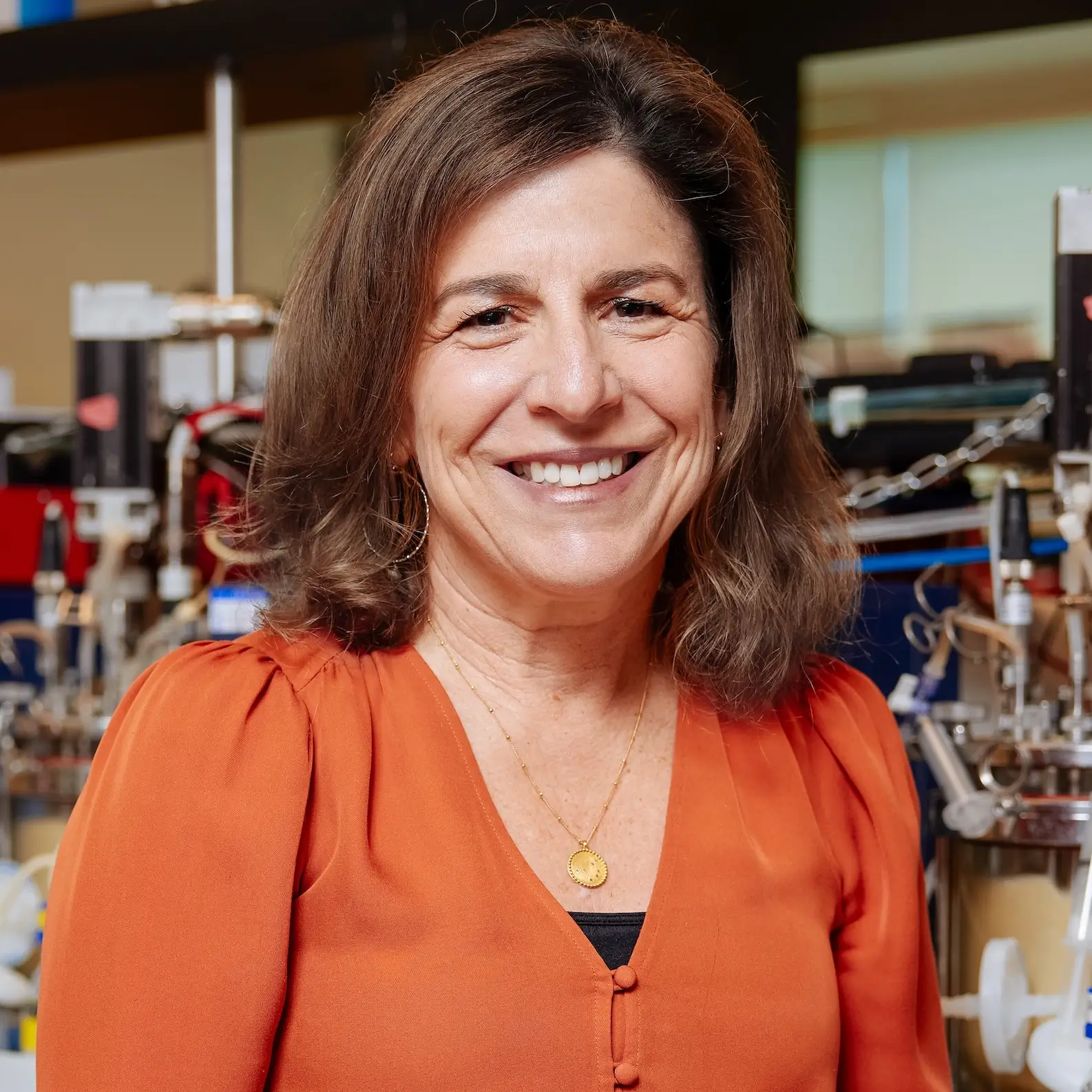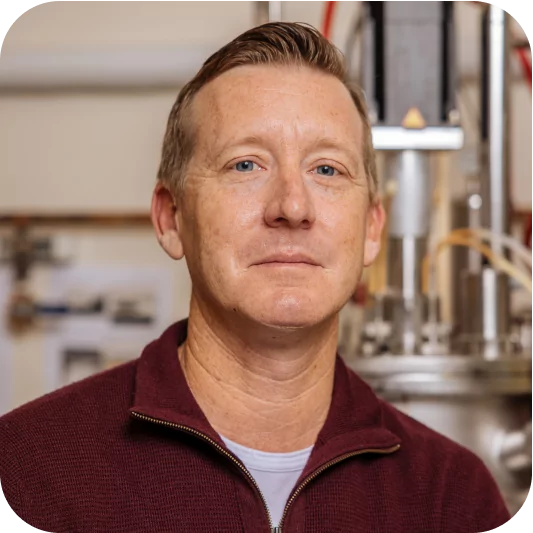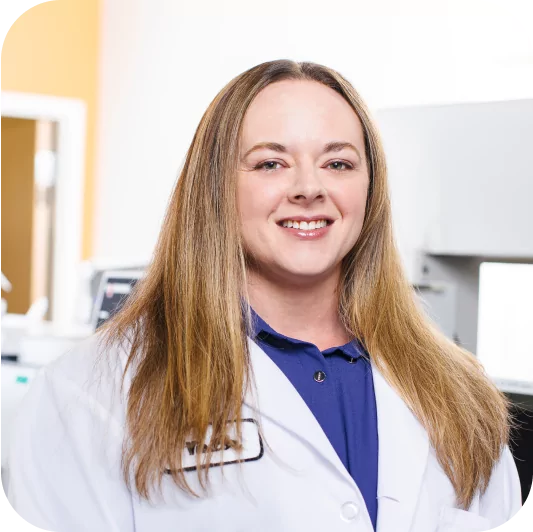Pharmaceutical supply chain vulnerabilities continue to pose significant risks to national security and public health, but domestic partnerships are paving the way for innovative, advanced manufacturing solutions. Antheia is proud of our recently announced strategic collaboration with Phlow Corp., a modern contract development and manufacturing organization (CDMO) on a mission to bring essential medicine production to the U.S. Antheia’s advanced biosynthesis platform and Phlow’s state-of-the-art manufacturing infrastructure are enabling a new era of American pharmaceutical supply chains.
Ahead of the announcement, we sat down with Dr. Kristy Hawkins, Co-Founder and Chief Scientific Officer at Antheia and Dr. Andrew Carpenter, Chief Scientific Officer at Phlow Corp. to discuss the partnership, the current state of pharmaceutical manufacturing, and what the future holds for American medicine production. Here’s what they had to say:
Dr. Carpenter, can you tell us about your background and what brought you to Phlow?
Andrew: I’m a trained synthetic organic chemist who knew early on that I wanted to make a difference in the pharmaceutical field by helping to create, identify, and now manufacture medicines. I’ve been fortunate throughout my career to work on molecules that have made it to market, including a drug called LIVMARLI for Alagille syndrome that patients are taking today to improve their quality of life. Not many chemists can say they’ve seen their work reach patients in that way, so that fulfilled a dream for me.
After years in drug discovery, I took a chance by moving into contract development manufacturing, which is very different. I learned about current Good Manufacturing Practice (cGMP) guidelines and was introduced to flow chemistry, a technology that has been used in other industries for decades but is not widely adopted in pharma due to various headwinds. I enjoyed managing those projects at AMPAC Fine Chemicals and I was introduced to advanced technologies like biocatalysis, fermentation, and automation. When I joined Phlow in September 2020, I was motivated by the mission of bringing pharmaceutical manufacturing back to the U.S. The reality is that not having control over our supply chains represents both a healthcare emergency and a national security risk. This gave me an opportunity to bring to bear some of these advanced technologies for essential medicine supply chains that still rely on decades-old manufacturing methods.
Can you share more about Phlow’s evolution and recent milestones?
Andrew: We’ve evolved significantly from our origins. Initially, we were largely focused on standing up manufacturing facilities and establishing the Strategic Active Pharmaceutical Ingredient Reserve (SAPIR), a federally backed program pioneered by Phlow to secure the U.S. medicine supply chain by developing, manufacturing, and stockpiling critical drug ingredients domestically while ensuring rapid conversion into lifesaving medicines during emergencies. We’ve now transitioned to an operational phase, completing our validation campaign for epinephrine (an API that’s frequently in shortage) and demonstrating large-scale production capabilities. The U.S. government’s investment in Phlow has catalyzed broader progress in advanced manufacturing throughout our region, and this public-private partnership approach has been crucial to our success.
We’re also very proud of the incredible team we’ve built that spans technical expertise, quality assurance, finance, and regulatory compliance. We’re attracting excellent talent to Richmond, Virginia and establishing a new biotech hub.
Dr. Hawkins, what drew Antheia to partner with Phlow?
Kristy: The partnership makes perfect sense given our shared goals of reshoring supply chains for APIs and key starting materials (KSMs). Antheia focuses on plant natural products that can be produced with advanced biosynthesis and biomanufacturing technologies. However, there are many pharmaceutical products that require both fermentation and synthetic chemistry to reach the final API. Together, we can access a much broader range of essential medicines than either company could tackle alone.
This partnership allows us to each focus on what we do best to enable domestic production of some of the most critical medicines for American healthcare systems.
How do you see the combination of Phlow’s continuous flow chemistry and Antheia’s biosynthesis platform creating a more resilient and efficient future for American pharmaceutical manufacturing?
Kristy: Fermentation technology isn’t new, but we’re taking it to the next level with advanced strain engineering and large scale, cost-effective manufacturing. The pharmaceutical industry is already familiar with fermentation for antibiotics and biologics like insulin, and we’re applying the same principles to complex molecules that historically can’t be synthesized efficiently. By combining Antheia’s biosynthetic KSMs with Phlow’s continuous flow chemistry approach for processing raw materials into APIs, we can accelerate domestic manufacturing of many essential medicines and offer a cost-competitive solution.
Andrew: Antheia’s technology is complementary to Phlow, and we can accomplish much more together as partners, especially amid the recent national effort to onshore pharma supply chains. Many raw materials that we can’t source domestically can be accessed through fermentation. When Antheia can produce these domestically, we’ll have full end-to-end access for APIs, which is critically important to the government as it works to regain supply chain control in the U.S.
We also appreciate that fermentation is inherently more sustainable than traditional batch processing. We are always thinking about how we can reduce waste and lessen the environmental burden of pharmaceutical manufacturing, and this is a distinct advantage of fermentation technology.
What are the most significant vulnerabilities in the current U.S. pharmaceutical supply chain, and how do your respective technologies address them?
Andrew: If we look at the APIs that Antheia has in its pipeline, many don’t have domestic sources, so those products are among the most vulnerable. Biomanufacturing allows us to achieve higher purity while bringing on-demand production to U.S. soil, directly addressing the vulnerabilities that concern the government. On the Phlow side, flow chemistry also works with portable equipment that can be dedicated to a specific product, which allows us to be more nimble and shorten the manufacturing timeline. We can also eliminate a lot of intermediate steps by daisy-chaining multiple flow steps together, cutting down on costs.
Kristy: Approximately 90% of essential medicines are sourced from only two countries, and many plant-sourced medicines are increasingly vulnerable due to years-long growing cycles, climate events, and geopolitical tensions. Even if we could grow these plants domestically, there would still be significant vulnerabilities in the supply chain.
Fermentation helps address this by reducing production time from years to weeks while maintaining quality and reliability. Antheia’s fermentation capacity is also highly flexible. We can simply introduce a different strain to manufacture a new product, using the same infrastructure, equipment, and downstream processing operations for final isolation.
Successfully onshoring pharmaceutical supply chains requires more than simply bringing legacy manufacturing processes to the U.S. Instead, we must prioritize advanced manufacturing technologies that enable the next generation of pharmaceutical manufacturing.
What role does adequate domestic biomanufacturing infrastructure play in this challenge, and what needs to happen to get us there?
Andrew: The industry as a whole fluctuates with capacity problems. Some years there are too many projects coming in and other years there is a lot of idle capacity. For advanced manufacturing specifically, there aren’t many new facilities being built, so a lot of companies are relying on outdated infrastructure that was built in the 1960s or 1970s. Phlow’s new facilities are unique in that they can handle both batch and continuous processing and are built with a high level of automation that allows us to provide manufacturing at competitive rates.
Kristy: There’s still insufficient capacity for fermentation, so we need to both build new capacity and make better use of existing facilities. Much of the existing fermentation capacity is underutilized because it’s not fit for biomanufacturing technologies. For example, large tanks used to make ethanol would require a large capex investment to retrofit for our processes, including upgrading the downstream processing equipment. Public-private partnerships are extremely important in driving these types of infrastructure investments that will ultimately enable fully domestic pharma supply chains.
Andrew: I’d also add that having purchase commitments for the downstream products Antheia and Phlow are making are critical to offset the cost of investment and operating costs. The government can play a role here by creating incentives that stimulate commercial demand for domestically produced medicines, which would strengthen the entire ecosystem for the U.S. pharma supply chains.
From a national security perspective, what medicine categories should be prioritized for domestic production? Which ones are Phlow and Antheia working on?
Andrew: Antibiotics, analgesics, sedatives, rescue agents like epinephrine, and medical countermeasures are a big focus for Phlow and the U.S. government. If a country we rely on for these critical medicines were to cut off our supply, there could be fatal consequences across the U.S., so producing these drugs domestically is a national security imperative.
Kristy: Antheia focuses on medicines from the FDA and WHO essential medicines lists that are often in shortage, including life-saving drugs for emergencies. Our first product is thebaine, a KSM used in overdose rescue medicine Narcan, and other pain relief medications. It’s going to take multiple different technologies to manufacture all essential drugs, and while Antheia is well-positioned to address many of them, some will still require synthetic chemistry optimization. Combining our respective expertise will enable us to bring the benefits of advanced manufacturing to a wider range of medicines.
Looking ahead, what excites you most about the future of American pharmaceutical manufacturing?
Kristy: The biggest milestone for Antheia will be launching our U.S. manufacturing operations and producing thebaine, among other products in our pipeline, domestically. Further down the line, we’re also excited about the potential to leverage fermentation for drug innovation and drug discovery projects, especially where we may be able to combine our biosynthesis platform with other advanced manufacturing technologies.
Andrew: I’m excited about when we can announce that we’ve validated a process for an API with a complete end-to-end solution, essentially taking products off the shortage list. While API supply isn’t always the reason for drug shortages, having adequate domestic supply ensures we have adequate supply of critical medicines for the American public during public health emergencies.
—
Antheia’s partnership with Phlow brings together two naturally curious scientific teams to explore new ways to domestically produce some of the most important essential medicines for public health. With both companies working together, the U.S. has more tools than ever to solve these complex pharma supply chain challenges.
Follow Antheia on LinkedIn and X/Twitter.
